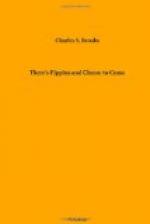But I am not disposed toward any of these subjects, least of all the cat, upon which I look—despite the coldness of her nature—as a harmless and comforting appendage of the hearth-rug. I would no more prey upon her morals than I would the morals of the andirons. I choose, rather, to slip to another angle of the question and say a few words about cowards, among whom I have already confessed that I number myself.
In this year of battles, when physical courage sits so high, the reader—if he is swept off in the general opinion—will expect under such a title something caustic. He will think that I am about to loose against all cowards a plague of frogs and locusts as if old Egypt had come again. But cowardice is its own punishment. It needs no frog to nip it. Even the sharp-toothed locust—for in the days that bordered so close upon the mastodon, the locust could hardly have fallen to the tender greenling we know today—even the locust that once spoiled the Egyptians could not now add to the grief of a coward.
And yet—really I hesitate. I blush. My attack will be too intimate; for I have confessed that I am not the very button on the cap of bravery. I have indeed stiffened myself to ride a horse, a mightier feat than driving him because of the tallness of the monster and his uneasy movement, as though his legs were not well socketed and might fall out on a change of gaits. I have ridden on a camel in a side-show, but have found my only comfort in his hump. I have stroked the elephant. In a solemn hour of night I have gone downstairs to face a burglar. But I do not run singing to these dangers. While your really brave fellow is climbing a dizzy staircase to the moon—I write in figure—I would shake with fear upon a lower platform.
Perhaps you recall Mr. Tipp of the Elia essays. “Tipp,” says his pleasant biographer, “never mounted the box of a stage-coach in his life; or leaned against the rails of a balcony; or walked upon the ridge of a parapet; or looked down a precipice; or let off a gun.” I cannot follow Tipp, it may be, to his extreme tremors—my hair will not rise to so close a likeness of the fretful porcupine—yet in a measure we are in agreement. We are, as it were, cousins, with the mark of our common family strong on both of us.




